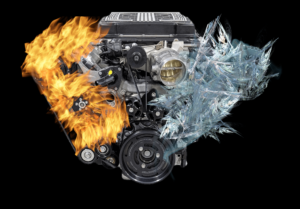Motor Oil

Motor Oil is responsible for engine wear protection as well as protection of all moving parts. Motor oil, or engine oil, is designed to lubricate, but also collects contaminants shed from the combustion process. Changing and checking your oil frequently will help keep your car running smoothly and prevent a build-up of sludge or other contaminants.
Commercial and Industrial

Commercial and industrial lubricants occupy a much larger segment of the industry than the automotive sector. These lubricants are used in manufacturing, heavy duty applications, construction and highly specialized cases. Industrial applications have more extreme demands, requiring these lubricants to be formulated with specific properties like extreme pressure, heat resistance or anti-wear and anti-corrosion additives.
Hydraulic Oils

Hydraulic oil is a specially formulated oil used in hydraulic systems to transmit power. Hydraulic systems are widely used in various industries and applications, ranging from heavy machinery and construction equipment to aircraft and automotive systems. The main functions of hydraulic oils is to lubricate, dissipate heat, provide hydraulic pressure, seal the system and avoid corrosion and contamination.
Transmission fluid

Transmission fluids and gear oils are very similar, but separated by the type of transmissions they service. Gear oils are designed to work within manual gear boxes while most transmission fluids are for automatic transmissions. The purpose of transmission fluid is to lubricate the bearings and metal parts within a gearbox , provide hydraulic pressure to keep parts working and to keep the transmission cool.
Gear Oil

Gear Oils pose a unique set of challenges compared to other lubricants. In non-gear applications, surfaces in motion are typically sliding or rolling, however, gear teeth encounter the challenge of both simultaneously. Gear oils need to not only lubricate the gear teeth but also protect the bearings housed within the gearbox. Industrial gearboxes are subjected to demanding conditions characterized by high temperatures, heavy loads, and frequent exposure to contaminants like dirt, process debris, and water.
Grease
Grease is a semi-fluid to solid product of a dispersion of a thickener in a liquid lubricant. The dispersion of the thickener forms a two-phase system and immobilizes the liquid lubricant by surface tension and other physical forces. Other ingredients are commonly included to impart special properties.
Antifreeze & Coolant

Antifreeze is an additive in radiator fluid that stops coolant from freezing in low temperature applications. Usually refined from Glycol, antifreeze lowers the freezing point of coolant to prevent it from forming ice, which can put stress on or crack the engine block. Coolant is a mixture of antifreeze and water that circulates around the engine absorbing excess heat. Due to its high water content, some coolants are made for specific climates and can withstand hotter temperatures with a high boiling point.
Food Grade Lubricants

Food grade lubricants are any lubricant that is considered safe for incidental contact with products that will be consumed by humans or animals. These lubricants are used to lubricate the machines that manufacture food, beverages, medicines/supplements, cosmetics and pet/animal food.

